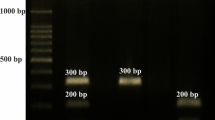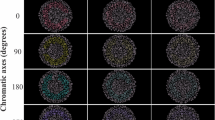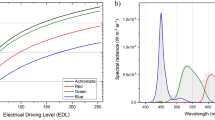Abstract
FOR theories of colour vision it is important to consider the relationships between the saturation and photopic brightness-levels of certain colours for anomalous and red-green blind subjects.
This is a preview of subscription content, access via your institution
Access options
Subscribe to this journal
Receive 51 print issues and online access
$199.00 per year
only $3.90 per issue
Buy this article
- Purchase on Springer Link
- Instant access to full article PDF
Prices may be subject to local taxes which are calculated during checkout
Similar content being viewed by others
References
Pickford, R. W., J. Psych., 27, 153 (1949).
Pickford, R. W., Nature, 161, 27 (1948).
Piéron, H., “La Sensation", 151ff. (1944).
Walls, G. L., “The Vertebrate Eye’ 98 (1942).
Pickford, R. W., Nature, 162, 414 (1948).
Granit, R., “Sensory Mechanisms of the Retina", Section IV (1947).
Rivers, W. H. R., “Schafer's Text-Book of Physiology", Vision (1900).
Collins, M. “Colour Blindness", 2 and 217 (1925).
Houstoun, R. A., “Vision and Colour Vision". chapter 14 (1932).
Author information
Authors and Affiliations
Rights and permissions
About this article
Cite this article
FICKFORD, R. Brightness and Saturation of Colours in Red-Green Defectives. Nature 164, 236–237 (1949). https://doi.org/10.1038/164236b0
Issue Date:
DOI: https://doi.org/10.1038/164236b0
Comments
By submitting a comment you agree to abide by our Terms and Community Guidelines. If you find something abusive or that does not comply with our terms or guidelines please flag it as inappropriate.



